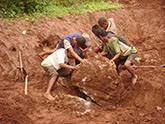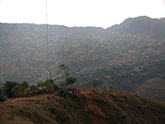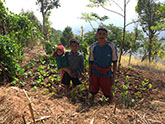FIDR is a non-governmental organization working to support children in developing countries and people affected by disasters.

Issues the Project Tackles
Nepal has been in the progress of reconstructing its nation from the civil war in 1990s, however, its HDI (Human Development Indicator) ranks one of the lowest among Asian countries. Various problems exit in education, health, food security and local economy, which directly affect to peoplefs lives, and especially people in mountainous areas are in serious poverty.Although Dhading district locates adjacent to the west of capital city of Kathmandu, its adult illiteracy rate, malnutrition rate of children under 5 years of age, maternal mortality rate are remarkably high. Four areas targeted by this project are places where there is very high proportion of Dalit families and public services and the system to support peoplefs lives are extremely weak.
Dalit: People placed at the lowest bottom segment of society, are regarded as outcaste group and persecuted in society. Dalit means goppressedh and they address themselves with this word.
Background of the Issues
As steep landscape of the Himalayan Mountains has been a huge blockage for the move of people and the transportation of materials, electrical and telecommunication services have not been easily extended. In addition to this topographical constraint, local governments are not in the situation to fulfill their functions properly and extend public services as they have just recovered from the civil war. Villages, the smallest administrative units, recognize the necessity to solve their local problems in a comprehensive way, however, they are not able to deal with them properly. Therefore, swift response to improve the quality of life of each household and at the same time with strengthening villagesf self-governance capacity is urged.
Project Period
September 2011 - March 2018Project site
Khalte, Khalleri, Kumpur, Sunaula-Bazar VDCs in Dhading District, Bagmati ZoneBeneficiaries
Approx. 41,000 people (approx. 7,500 households) of 4 VDCs (Village Development Committee) in Dhading DistrictMain Activities
| 1. | Improvement of agricultural productivity: Improvement of agricultural land and farming method |
| 2. | Strengthening school and local health activity: Training for local health workers and introduction of school health service |
| 3. | Increase of household income: Introduction of new crops and utilization of local resources |
| 4. | Improvement of educational environment: Teachersf training |
| 5. | Strengthening local communities: Development of local leaders, Supporting community activities |
Our Approach
| 1. | Tackle with local problems and issues in working with local governments |
| 2. | Improve the quality of life of households in the lowest bottom segment of society with their close participation and with their initiatives |
| 3. | Working closely with local NGOs and enhancing ties and cooperation among stakeholders in the area, we make various improvements to solve problems of each household. Nepal has been receiving plenty of assistance from many aid organizations and in various sectors until present. As various useful knowledge and skills have been already accumulated within the nation, we do not intend to bring something new from outside, but proactively utilize what are available at locals, which mean something tried in the past, and which have been introduced in surrounding areas, so that local people will be able to be aware of available local resources and easily utilize them to make small yet continuous improvements and realize better living conditions. |
Partner Organization
Japan Nepal Health and Tuberculosis Research Association (JANTRA)Youth Campaign for Social Progress (YOUCASP)























